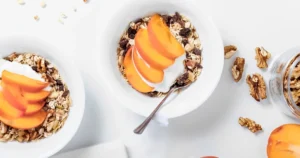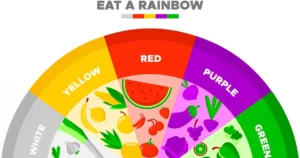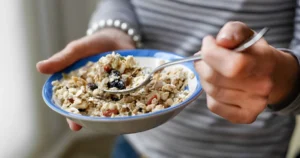Everyone must inculcate healthy diet habits. These habits make people fit and fine. Fortunately, college students have more nutritious options; wise choices throughout the day can add to long-term, sustainable health habits. Healthy diets for college students are crucial as they must remain fit to be active.
How Can You Prevent College Weight Gain?
Students can benefit from the on-campus dining options. Learning is taking place now, and the dining hall can double as a classroom. To assist you in making wise, knowledgeable dietary decisions:
- Learn more about food composition and nutrition.
- Discover the fundamentals of food preparation and cooking.
- Get more knowledge about the sources of your food
- Increase awareness of how specific foods affect you as an individual
- A successful and joyful encounter is more likely for those who eat foods that energize their bodies.
Below are a few tips for healthy diets for college students
-
Begin your day with a healthy breakfast

Breakfast is the most important meal of the day. A balanced meal has several health advantages, such as excellent cognitive performance, longer attention spans, better memory, and improved concentration. Students who eat breakfast tend to be more attentive in class. As a result, they achieve better grades and results on standardized tests. Also, they demonstrate more effective problem-solving abilities, enhanced hand-eye coordination, improved memory recall, improved fact understanding, and stabler energy levels.
Plan and resist the urge to leave on an empty stomach. Load up on quick-cooking, healthful items, and prioritize protein to keep you full.
Three examples of healthy breakfasts are
- Eggs, whole wheat toast, and fruit
- Protein shakes
- Greek yogurt with granola and berries
Breakfast eaters typically weigh less than breakfast skippers. They are more likely to have a body mass index within a healthy range. Contrary to widespread opinion, skipping breakfast increases your risk of gaining weight rather than decreasing it. Regular breakfast eaters have lower calorie and fat intake than non-breakfast eaters daily. Also, they are less likely to overeat at night.
-
Snack often

It may look counter-intuitive, but nutritionists encourage snacking in small between meals to manage your appetite. They advise eating every two to four hours to control hunger, avoid overeating at meals, and avoid gaining weight. But not all snacks are created equal. Keep wholesome, energizing foods in your backpack, dorm, and other conveniently accessible places for this reason.
-
Establish an eating routine

Resist grabbing a quick bite in the dining hall. Setting yourself up for success and maintaining a regular eating pattern will keep your body and mind functioning at their peak. Try to time your meals for when you are hungry rather than waiting until you are starving. If you overeat, it’s probably because you’re too hungry. Likewise, refrain from skipping meals so you can study, come to class early, or sleep in.
-
Make balanced meals

At least three to four major food categories should be present at every meal. Combining high-quality carbohydrates, lean protein, and heart-healthy fats is necessary to ensure the optimal functioning of the body and the brain. Whole grains, fruits, starchy vegetables, some low-fat and fat-free dairy products, and whole grains are all excellent sources of carbohydrates.
These nutrient-rich carbohydrates supply long-lasting energy. Moreover, they offer fiber, B vitamins, iron, zinc, antioxidants, and various phytochemicals. Protein is the most filling nutrient. However, it helps to regulate appetite and control hunger. In addition, it stabilizes blood sugar levels, protects lean muscle mass, heals bodily tissues, and produces hormones and enzymes.
Skinless poultry, lean beef and pork, beans, lentils, eggs, nuts, seeds, nut/seed butter, and casein-based dairy products are foods high in protein. In addition, heart-healthy fats are found in avocados, nuts, seeds, nut butter, olives, fatty fish, and oils.
Heart-healthy fats as chemical messengers. They help in nerve transmission, help the absorption of specific vitamins and protect vital organs.
-
Eat the rainbow

These healthy diets for college students are pretty essential. Fruits and vegetables should make up half of your plate. They may add flavor, color, and nutrition to your meals. However, they contribute a few calories while increasing the overall amount of food in a meal. Avoid the high-calorie salad extras if a salad bar is available. Instead, choose modest portions of beans, dried fruit, nuts, or seeds.
Alternatives to creamy salad dressings that are heart-healthy include vinaigrette dressings. Instead of mixing salad dressing into the salad, place a small container on the side to help with portion management. For example, dunk your fork into the dressing before spearing each piece of lettuce. This trick ensures you get the taste of the salad dressing with each bite while using very little sauce.
-
Increase whole grains

Healthy diet habits are essential for everyone to be fit. These habits will help in easy life to survive. Choose more whole-grain items, whether it’s 100% whole-grain cereal in the morning or whole-grain bread at the sandwich station.
Many campus dining facilities provide brown and wild rice, quinoa, oatmeal, whole-grain pasta, whole-grain rolls or buns, whole-grain bagels, English muffins, whole-grain pita bread, whole-grain tortillas, and even whole-grain pizza crust. Whole grains are high in dietary fiber, which promotes digestion, sustains energy levels, reduces cholesterol, stabilizes blood glucose, and alleviates constipation; dietary fiber makes you feel full.
Reduced adiposity and reduced body weight are both associated with adequate consumption. In addition, regularly consuming whole grains may reduce the risk of developing malignancies, diabetes, diverticulosis, and cardiovascular disease.
Nevertheless, looking at a food’s ingredients, you can tell if it contains whole grains. According to weight, the elements are presented in decreasing order. There are more of the first ingredients than anything else in the product. If the first ingredient has the word’ whole,’ it can be interpreted to mean that the primary ingredient is a whole grain.
Whole grains, multigrain, and wheat products do not typically include a lot of fiber.
-
Exercise portion control

This is one of the essential healthy diet habits. Students frequently want to make the most of their food plans and save money. Make it a point to use a smaller dish and eat it in smaller portions. Then, if you are still hungry, you can always return for more food—Savour the flavor of your food rather than eating quickly. Slow down the speed at which you eat, and chew more.
Try to chew each bite more thoroughly and rest your fork between them. You will inevitably feel more contended with less food. Wait 10 to 15 minutes before convincing yourself you need more food. Then, drink a glass of water. Make sure that the food will still be there tomorrow.
-
Re-think what you drink

Healthy diets for college students are essential for teenagers to build a strong metabolism. Avoid drinking extra calories in regular soda, fruit juices, high-fat or flavored mil varieties, fruit punch, lemonade, milkshakes, sweetened tea, or specialty coffee beverages. Instead of using cream in your coffee or tea, ask for skim, 1%, or soy milk.
This helps keep the calories from adding up. Therefore, it also counteracts unstable blood sugar levels, which do not allow the study. Check top food trends for your healthy diet.
-
Be active

Find a group of buddies who will hold you responsible for remaining active, or choose to walk to class. Exercise will help you avoid the freshman and is proven to lower stress levels, boost mood and improve your sleep schedule.
-
Get enough sleep

This comes under important healthy diet habits as every person must sleep around seven hours. According to studies, it’s harder to gather the energy for exercise when you’re sleep deprived. So, for optimum health, establish a reliable bedtime routine and prioritize your sleep.





